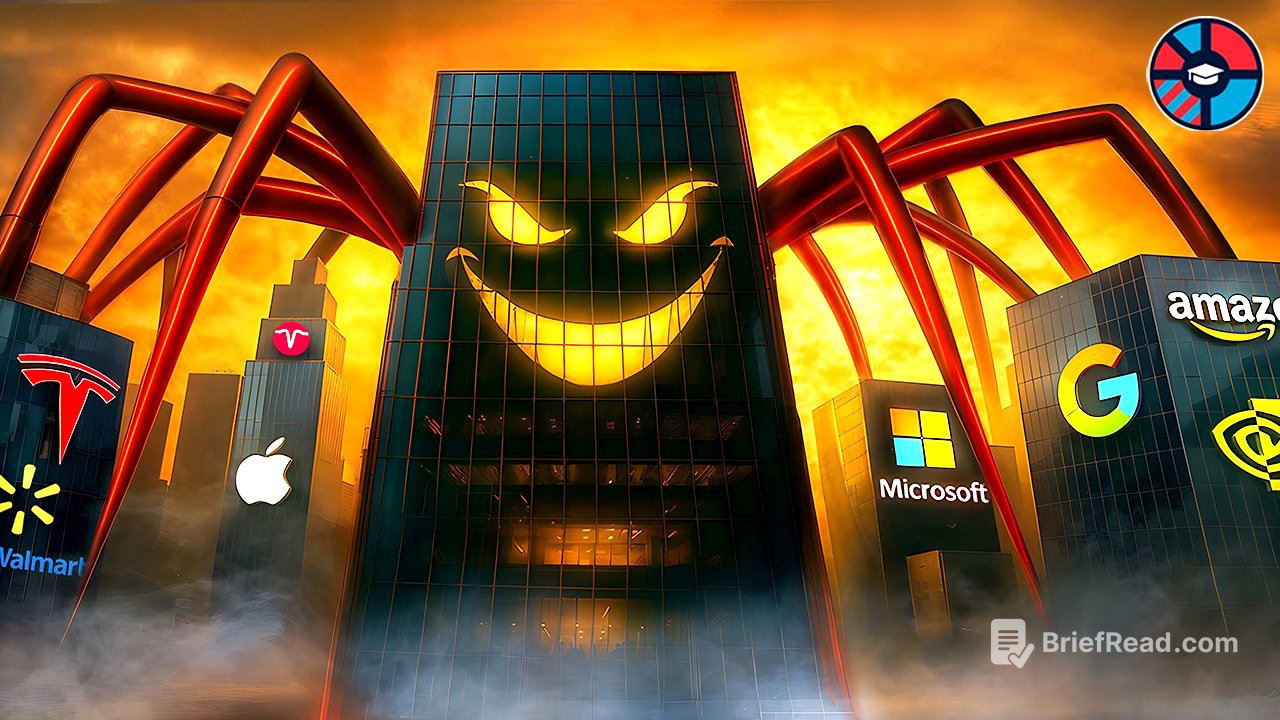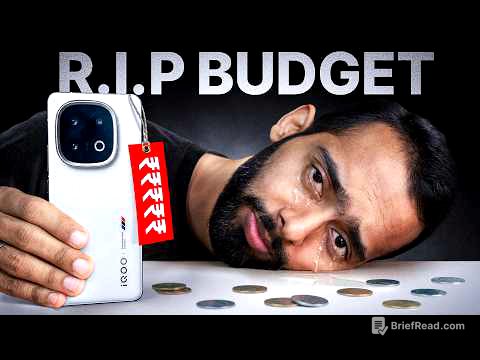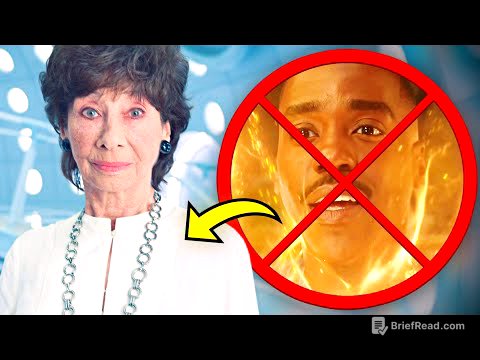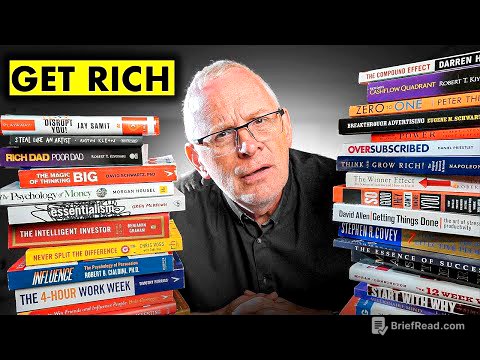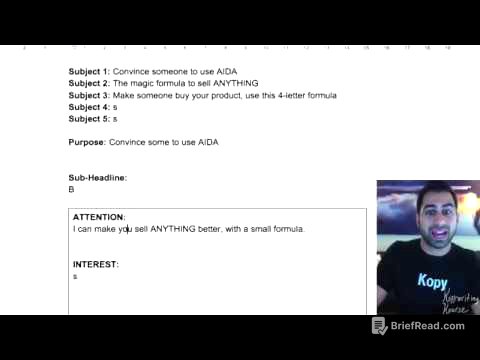TLDR;
This video explores the complex ownership structure of major American corporations, revealing that many are primarily owned by institutional investors like investment funds, banks, and insurance companies. It identifies three key companies—Fidelity, BlackRock, and Vanguard—that control a significant portion of the U.S. economy. The video explains how these firms operate, who their key figures are (like Larry Fink of BlackRock and John Bogle of Vanguard), and how they have risen to prominence. It also discusses the role of ETFs and mutual funds in distributing ownership among millions of ordinary investors, while also noting that true control often remains with the financial giants managing these funds. Finally, the video touches on Warren Buffett's unique approach through Berkshire Hathaway, which uses insurance premiums to acquire and hold significant stakes in various companies.
- Institutional investors, not individuals, are the primary owners of many major corporations.
- Fidelity, BlackRock, and Vanguard control a large portion of the U.S. economy.
- ETFs and mutual funds distribute ownership among many investors but centralize control.
- Warren Buffett's Berkshire Hathaway uses insurance premiums to acquire company stakes.
Введение [0:00]
The video starts by highlighting the immense value of top American corporations, noting that the top ten alone are worth more than China's GDP. While many of these companies are associated with well-known billionaires like Elon Musk (Tesla), Mark Zuckerberg (Meta), Jeff Bezos (Amazon), and Bill Gates (Microsoft), others, such as Visa, Mastercard, Boeing, Procter & Gamble, and Pepsi, do not have easily identifiable individual owners among the world's wealthiest. The search for the owners of these firms leads to the discovery that institutional investors, such as investment funds, banks, and insurance companies, hold significant shares. Even in companies led by famous figures like Larry Page, Sergey Brin, Jeff Bezos, Bill Gates, and Mark Zuckerberg, institutional investors own substantial portions, reducing the founders' actual control. A study from Cambridge University reveals that 88% of large U.S. corporations are controlled by just three companies, which the video aims to identify and explain.
Часть 1. Пир во время чумы [3:49]
In May 1930, during the Great Depression, Fidelity Shares was founded in Boston as a small investment fund. Investment funds manage money for individuals, charging a commission for their services. The creation of Fidelity during such a severe economic crisis was unusual, but the founders invested just over $40,000 to start. Despite the challenging times, Fidelity grew its capital from $40,000 to $3.5 million in three years. In 1941, as the U.S. entered World War II, the stock market declined, and many funds faced losses. At this critical moment, Edward Johnson II, a Harvard graduate with a successful legal career, stepped in to manage Fidelity. Recognizing the opportunities presented by the crisis, Johnson restructured the fund by selling unprofitable assets, hiring new talent, and implementing modern management practices. He believed that the market would recover after the war, making it crucial to be prepared for growth.
Часть 2. Миллионы на миллиарды [13:29]
The United States emerged from World War II as a superpower, driving significant economic growth. This boom led to a thriving stock market, benefiting companies like General Motors, Boeing, and US Steel. Fidelity, under Edward Johnson II, also experienced substantial growth, paralleled by the rise of his son, Edward Johnson III. The younger Johnson eventually led Fidelity's Magellan fund, which invested in smaller, promising companies. In 1977, Edward Johnson III became the head of Fidelity, and Peter Lynch took over Magellan. Under Lynch's management, Magellan's capital grew from $18 million to $14 billion over 13 years, achieving an average annual return of 29%. Interestingly, John Rothschild co-authored Peter Lynch's investment books. Today, Fidelity is led by Abigail Johnson, Edward Johnson II's granddaughter, who owns 28.5% of the company. While Fidelity manages $5.9 trillion in assets, Abigail Johnson's net worth is only around $33 billion, leading to questions about who owns the remaining assets.
Часть 3. Властелины мира [25:41]
The video shifts focus to Larry Fink, the founder of BlackRock, which manages over $10 trillion in assets, making it the world's largest and most mysterious fund. In 1986, Fink, then a young and successful asset manager at First Boston, made an incorrect interest rate prediction that cost the bank $100 million. This setback led him to create BlackRock in 1988, emphasizing risk management. BlackRock's success is attributed to its automated risk management system, Aladdin, which gathers vast amounts of market data. During the 2008 financial crisis, BlackRock thrived by acquiring distressed assets and advising the U.S. government on managing toxic assets. Despite BlackRock's massive assets, Larry Fink's personal wealth is only around $1.2 billion, as he owns just 1% of the fund. The majority of BlackRock is owned by institutional investors, including major U.S. financial corporations like Bank of America, Wells Fargo, and JP Morgan, as well as Fidelity.
Часть 4. Изнанка мирового богатства [31:28]
The ownership structure of BlackRock reveals a complex web where major banks and funds own each other's shares. For example, BlackRock is a significant shareholder in State Street, while State Street is also a major shareholder in BlackRock. This creates a circular ownership pattern, making it difficult to identify the ultimate beneficiary. The video highlights that Vanguard Group owns 9% of BlackRock. Unlike BlackRock, Vanguard is not a public company and does not disclose its full financial details or list of shareholders. John Bogle founded Vanguard 50 years ago. Bogle's career was marked by a loss of $600 million during the 1973 oil crisis, leading him to create Vanguard. However, John Bogle passed away in 2019, and his estate was valued at only $80 million, a fraction of the assets managed by Vanguard.
Часть 5. Главный оракул современности [41:12]
Vanguard's success is rooted in its unique approach to investment management. Instead of actively managing funds and trying to beat the market, Vanguard focuses on passively tracking major market indexes like the S&P 500. John Bogle created the first index fund, offering investors a way to invest in the entire market rather than trying to pick individual winners. Vanguard's index funds have low fees and have become increasingly popular as investors realize the difficulty of consistently outperforming the market. Vanguard creates exchange-traded funds (ETFs) that allow investors to buy small pieces of a diversified portfolio. By the late 1990s, Vanguard's assets reached $500 million. Today, Vanguard, BlackRock, and State Street dominate the ETF market. These companies are not the true owners of the assets but rather service providers that earn fees for managing the funds. Vanguard is unique in that it is owned by its own ETF shareholders.
Конкурс [48:55]
The video concludes by discussing Warren Buffett's Berkshire Hathaway, which has generated an average annual return of 20% for over 60 years. Unlike BlackRock and Vanguard, Buffett uses insurance premiums to acquire and hold significant stakes in companies. This allows him to control these companies directly, rather than simply managing funds on behalf of clients. While ETFs and mutual funds distribute ownership among many investors, the real control often lies with the financial giants that manage these funds. The video suggests that while ordinary people may formally own a piece of the American economy through ETFs, the actual control is increasingly concentrated in the hands of financial giants like BlackRock and Vanguard. The video ends with a contest to win a book by Peter Lynch by commenting on which assets you invest in and why.
